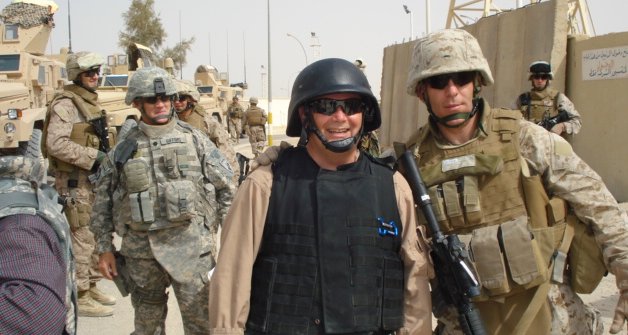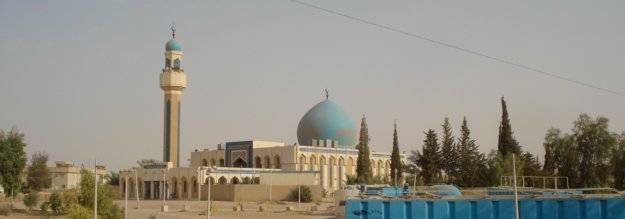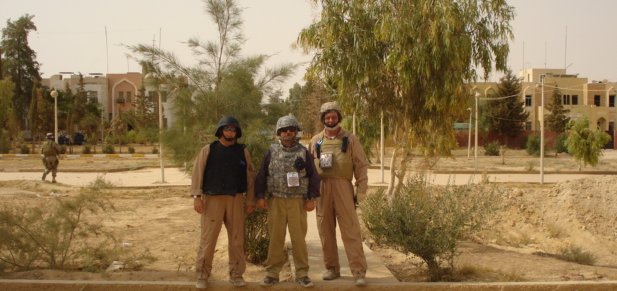Several members of the ePRT and representative of the RCT made a follow up visit to Anah, since I promised the mayor that I would come back with some experts to address particular things we had discussed. It is a follow up. Some of this entry will be similar to my entry re a couple weeks ago. Bear with me.
Below is one of my colleagues. His firm (RTI) gave him that gear. I think it is Wehrmacht surplus. It may have been a joke. It is the Darth Vader gear and the black color soaks up the hot Iraqi sun.

After Al Qaim, Anah is the best run city in our AO. Some of the reasons are clear. Anah’s mayor is someone who is competent, honest and who loves his city. The people of Anah mostly have come from someplace else, if for no other reason than that Anah physically moved around twenty years ago when the waters of Lake Qadisiya inundated the old city site. They are less tied to tribal loyalties and tradition than the inhabitants of most other areas in Anbar.
Below – Anah mosque.

During our last visit, the mayor mentioned that Anah do not suffer the energy problems endemic across Iraq. I asked the mayor some follow up questions about how they do it. Like every other city in Anbar, Anah draws power from nearby Hadithah Dam and like every other city in Anbar; it does not get enough to satisfy full demand 24/7 and must rely on local generation capacity. At this point Anah differs from all the others in that the authorities meter the electricity and charge for it. This both controls demand and increases supply by encouraging and paying for new capacity.
A contrasting example reveals contours of the situation. The city council chairman in Hit, who cried to us about how the lack of electrical power was making the people of his city suffer and demanded that WE do something to solve his problem, told me that the people of Hit already pay what he considered a lot for electricity; they pay a flat rate of 2000 dinar. With 2000 dinar, you can buy four cans of Coca-Cola equivalent at the market down the street, BTW. Of course, a flat rate does nothing to encourage wise use and a flat rate that low, which most people avoid paying anyway, is a joke. Unfortunately, it is a bad joke and it is told everyday across Iraq, but not in Anah. The Mayor of Anah told me that a family in his city pays between 10,000 and 20,000 dinar a month AND it is a variable rate. He does the same thing with water. People get a basic amount free and after that pay a variable rate.
One weakness of Anah is its lack of bench strength. Al Qaim has an excellent mayor, but he also has attracted and developed talented associates. There are many people who could carry on. Anah still depends too much on one heartbeat. A related weakness is the dependence on the mayor’s political leadership in general. The mayor is a hands-on kind of guy who knows and is involved in all the projects going on in his community. Many of these projects should not be managed by government at any level. To his credit, the mayor understands this too.
Below – ePRT team member in Anah

We revisited some of the big projects such as the dairy farm, chicken operation, fish hatchers and ecological restoration (which I willl talk about in a future post). We met some experts who were waiting for us at the projects and the mayor shared his vision of Anah as a center for agricultural and agricultural innovation. One of the experts told us that Iraq has once produced enough chicken to satisfy 95% of the domestic demand. Today that statistic is reversed, with Iraqi production accounting for around 5% of demand. Iraqis are very fond of chicken, so this is important. Everybody agreed that Anah could become a center for food production and that they have already made many of the first steps. Unfortunately, so far this has been an all government sponsored enterprise.
The Mayor said that he prefers private investment and that he hoped that sometime soon that private investment would take over. For the time being, however, there is no private investment screaming to invest in Anah and the city might have to go through a kind of socialist stage. Given the small size and local nature of this activity, Anah may avoid some of the most pernicious aspects of state sponsored enterprise and with any luck the politician can and will get out of the business at the earliest opportunity.
In the distance from the agricultural projects we could see the edge of Reyanah. It will not be long before Anah and Reyanah will merge. Reyanah is growing rapidly with influx and natural increase from the local Jughafi tribe. The two cities have significantly differently problems and populations. It will provide an interesting challenge for all involved.
Rawah is another interesting study in contrasts. Rawah is a 45 minute MRAP drive north and west of Anah. A drive in a normal car at a normal speed would get you there in fifteen minutes. We refer to the area as Rawah/Anah, but the two jurisdictions could not be more different. The mayor is a man of substance; he evidently weighs more than 300 lbs. He is jolly, laughing inappropriately – in a Jabba the Hutt style – to try to bridge over questions about his competence or honesty, but Rawah is a depressing place despite the advantages of its physical setting and in the surrounding countryside, which include excellent soil, access to water and a beautiful natural location. The mayor has focused on agriculture and tourism as the keys to his city’s future, but has taken no steps to encourage or facilitate either of these things except to ask Coalition Forces to build a hotel for the city. CF declined the opportunity. Eventually Rawah’s natural gifts and its location between a thriving Al Qaim and a probably soon to be thriving Anah will come into play. Perhaps the people can either get new leadership or trump the bad leadership with their energy.
Political leaders really cannot create jobs or prosperity. They can foster the conditions that will allow the people to do that for themselves, and some do it better than others. They can also be strong barriers to progress when they don’t do their jobs right. Iraq has examples of both kinds of leaders. I believe the good leadership and the energy of the people will determine the future, but the bad guys will be with us always too.
In other words, Iraq will become a normal country in more ways.
